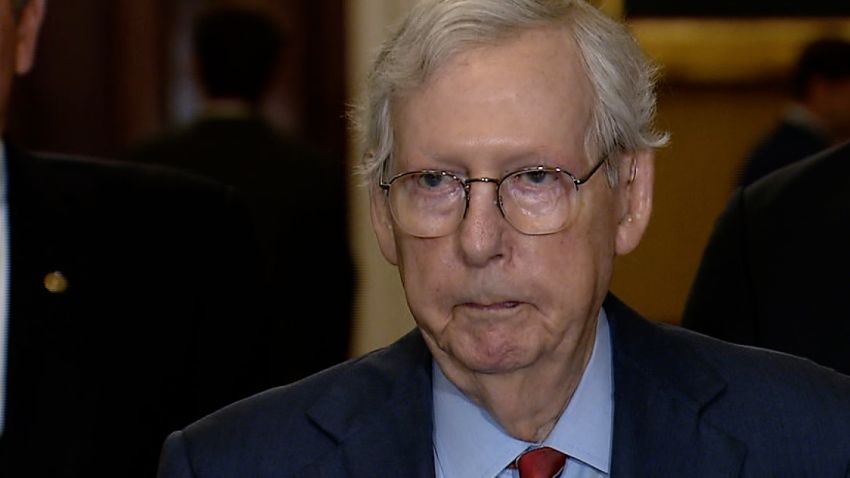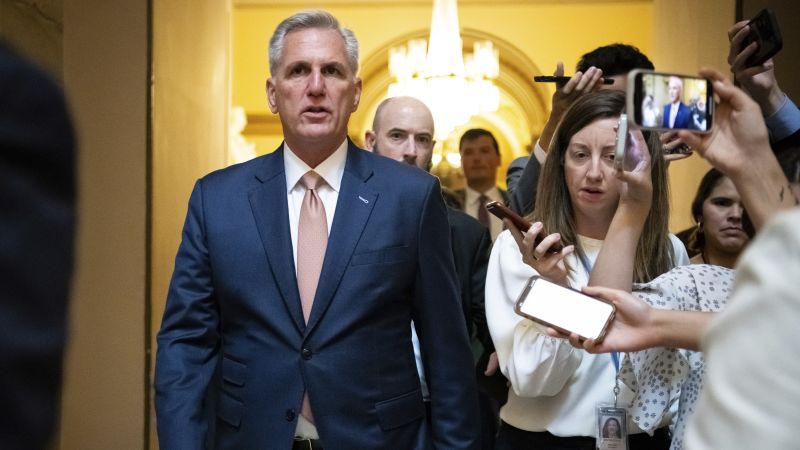unitedstatepolitics.blogspot.com
CNN —
House Speaker Kevin McCarthy and top Republicans have begun to strategize about how to move forward with an impeachment inquiry into President Joe Biden this fall – the latest sign that the House GOP is seriously laying the groundwork to initiate rare proceedings against the current president.
In recent weeks, McCarthy has privately told Republicans he plans to pursue an impeachment inquiry into Biden and hopes to start the process by the end of September, according to multiple GOP sources familiar with the conversations. While McCarthy has already publicly threatened to launch an inquiry if allegations from IRS whistleblowers hold up or if the Biden administration does not cooperate with requests related to House Republicans’ Hunter Biden probe, sources say that McCarthy has sent even stronger signals about his intentions behind closed doors.
But leadership recognizes that the entire House Republican conference is not yet sold on the politically risky idea of impeachment. That’s why one of the biggest lingering questions – and something Republicans have been discussing in recent weeks – is whether they would need to hold a floor vote to formally authorize their inquiry, sources say. There is no constitutional requirement that they do so, and Republicans do not currently have the 218 votes needed to open an impeachment inquiry.
Skipping the formal vote, which would be a tough one for many of the party’s more vulnerable and moderate members, would allow Republicans to get the ball rolling on an inquiry while giving leadership more time to convince the rest of the conference to get on board with impeachment. During former President Donald Trump’s first impeachment, House Democrats ended up voting to both formalize their inquiry and set parameters for the process after initially holding off on doing so amid divisions within their ranks.
“I don’t believe that a vote of the House is required to open an impeachment inquiry,” GOP Florida Rep. Matt Gaetz, who supports a Biden impeachment and sits on the House Judiciary Committee, told CNN.
Another factor that could complicate the fall timeline for an impeachment inquiry: Government funding expires at the end of September. McCarthy has already signaled they will need a short-term spending patch to keep the government’s lights on, which hardline conservatives have balked at.
Officially moving ahead with an impeachment inquiry could help keep angry conservatives off McCarthy’s back. And the speaker himself has linked the two issues publicly, warning that a government shutdown could hinder House Republicans’ ability to continue their investigations into the Biden administration – a direct appeal to his right flank, and a sign of all the competing pressures that the speaker is facing.
“If we shut down, all of government shuts down. Investigations and everything else,” McCarthy said Sunday on Fox News.
Republicans have pointed to unverified allegations that Biden profited from his son’s foreign business dealings as grounds for impeachment and have also alleged that there was political interference at the Department of Justice in the ongoing Hunter Biden criminal case – neither of which Republicans have been able to prove, which the White House and Democrats have repeatedly stressed. Even some Republicans are still not convinced that they have uncovered any evidence of high crimes and misdemeanors, which is the bar for impeachment.
President Biden has maintained no wrongdoing on his part as it relates to his son, Hunter, and the White House has repeatedly maintained the president was never in business with his son. Republican allegations of political interference in the Hunter Biden probe have been met with adamant denials from Attorney General Merrick Garland and other top Justice Department officials.
GOP Colorado Rep. Ken Buck, a member of the hardline Freedom Caucus who sits on the House Judiciary Committee, has previously accused McCarthy of engaging in “impeachment theater.”
And one GOP lawmaker, granted anonymity to speak more freely, offered an even blunter assessment: “There’s no evidence that Joe Biden got money, or that Joe Biden, you know, agreed to do something so that Hunter could get money. There’s just no evidence of that. And they can’t impeach without that evidence. And I don’t I don’t think the evidence exists.”
McCarthy called an impeachment inquiry a “natural step forward,” but when pressed by Fox News host Maria Bartiromo on whether he has the votes, the speaker demurred.
“Well, we have been out on summer recess,” McCarthy said. “When we go back, we’ll discuss this. But we find new information every week.”
In a statement Monday, White House spokesperson Ian Sams criticized Republicans in Congress over the prospect of an impeachment inquiry, writing, “This baseless impeachment exercise would be a disaster for congressional Republicans.”
Top Republicans have spent some of the August recess working to warm GOP lawmakers up to the idea of an impeachment inquiry.
Republicans on the House Judiciary Committee, where impeachment articles would originate, held a conference call with panel members last week to discuss the topic of impeachment and other matters, according to two lawmakers on the call.
During the call, Judiciary Chairman Jim Jordan of Ohio told members that McCarthy has been seriously discussing an impeachment inquiry, according to one of the lawmakers on the call, but didn’t specify a timeline.
And Gaetz said most members expressed support for an impeachment inquiry during the call.
“We had even some of our more moderate members saying that the oversight wasn’t serious if the next step wasn’t an impeachment inquiry,” Gaetz said of the call. “There was great interest among my Judiciary colleagues to really include and involve everyone in the conference. There’s a real desire to get everyone on board and go through the evidence with those who might remain skeptical.”
But not everyone is on board yet. During the call, one skeptical committee member pressed Jordan on the purpose of an impeachment inquiry, according to a source on the call. Jordan’s legal counsel then chimed in and argued that impeachment could strengthen their hand in court battles over document requests, since impeachment is enshrined in the constitution.
And McCarthy has been making the case, both publicly and privately, that an impeachment inquiry is not the same as an actual impeachment vote, though privately many Republicans believe that if they open an inquiry that they would have no choice but to follow through with impeachment.
Rep. Marjorie Taylor Greene, a Trump ally and a vocal proponent of a Biden impeachment, told CNN that the prospect of an impeachment inquiry “looks very, very good.” She said she spoke to McCarthy about it last week.
“He is spending the recess talking about it constantly,” Greene added. “I really feel strongly that that’s something that’s going to happen.”
As far as a potential timeline, Greene made her preferences known on social media: “We MUST vote on impeachment inquiry as soon as we get back in session mid September,” she tweeted over the weekend. “There are no excuses to wait.”
And Trump – who recently asked members on his plane to Iowa for updates on a potential Biden impeachment – is also keeping the pressure on Republicans to act, and has started to grow impatient with the pace of their efforts.
“The Republicans in Congress, though well meaning, keep talking about an Impeachment ‘Inquiry’ on Crooked Joe Biden. … You don’t need a long INQUIRY to prove it, it’s already proven,” Trump wrote on Truth Social on Sunday. “Either IMPEACH the BUM, or fade into OBLIVION. THEY DID IT TO US!”
Adblock test (Why?)
"politic" - Google News
August 29, 2023 at 12:59AM
https://ift.tt/BAXToEt
McCarthy starts to plot Biden impeachment strategy while GOP skeptics remain - CNN
"politic" - Google News
https://ift.tt/gXpAzT4
https://ift.tt/nAimxbN












/cloudfront-us-east-1.images.arcpublishing.com/bostonglobe/VNG7YMZTRWJ5WBFTJ5NVETPCQI.jpg)
Join the Conversation
Commenting on this and other recent articles is just one benefit of a Foreign Policy subscription.
Already a subscriber? .
Subscribe Subscribe
View Comments
Join the Conversation
Join the conversation on this and other recent Foreign Policy articles when you subscribe now.
Subscribe Subscribe
Not your account?
View Comments
Join the Conversation
Please follow our comment guidelines, stay on topic, and be civil, courteous, and respectful of others’ beliefs.